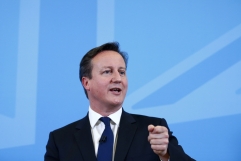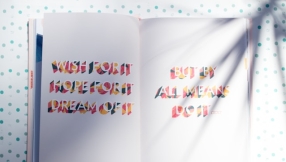The Dress. If you don't know about it then you must have been living in a cave. It's either white and gold or blue and black, depending on various things. It's science. Since the viral explosion the hashtag #thedress has been meme'd to exhaustion and used to advertise everything from glasses to Lego, Kit Kats, pizza, football kits and domestic violence awareness.
Yes, you read that right. Domestic violence awareness.
South African advertising agency Ireland/Davenport created the advert and approached Carehaven, a refuge for women (and their children) trying to escape violence and abuse from a partner or an ex, the refuge accepted their offer and the advert has gone viral.
I spend a large amount of my time communicating about the issue of domestic abuse. And I am seriously enthusiastic about opportunities to profile the issue on as large a scale as possible. Yet, immediately my concern was raised.
The advert shows a blonde white woman, lying in a vaguely "sexy" pose, pouting with vacant eyes. She is wearing The Dress, her eye is black with bruising, her lip is cut and her legs and knees are bruised. In large letters the advert asks: "Why is it so hard to see black and blue?" Underneath this: "The only illusion is if you think it was her choice. One in 6 women are victims of abuse. Stop abuse against women."
The advert's sentiments echo the beat of my heart. To end men's abuse of women. To challenge the message deeply embedded in the question, "Why doesn't she just leave?". The message that abuse is a choice that stupid women make, and for that message to be raised on a platform as big as the Entirety of the Internet, amazing.
Yet, still, my concern persists.
The advert was not designed by experts in stopping men's abuse of women. It was created by an advertising agency, succeeding in what they are experts in: advertising.
I, however, am an expert in working to end men's abuse of women and though I applaud both the Ireland/Davenport and the Salvation Army for their well-intentioned efforts to raise the profile of abuse, I have deep concerns about the efficacy and potential negative consequences of the advert. At teatime as I talked about writing this article my daughter asked why they'd used The Dress to raise awareness about abuse. My perceptive nine-year-old son answered, "Because it's fashionable." And therein lies the problem.
The advert has got people talking about domestic abuse. But it hasn't in any way changed the conversation about abuse. Raising awareness is not about doing something "fashionable". Pages clicked and hashtag trends are not a measure of raised awareness. This advert has (to quote my nine-year-old) made talking about domestic abuse "fashionable". It hasn't enabled people to understand the issue more or challenged the myths about abuse. In fact, it has reinforced at least six deeply problematic messages about abuse:
1. The offender is invisible
The woman lies within an empty space. The advert does not state, "Stop men's abuse of women" but rather, "Stop abuse of women". As Jackson Katz powerfully articulates in this TED Talk, when we make domestic abuse about women's suffering, we remove the responsibility from the perpetrator and leave society seeing this as a women's issue, that women should fix.
2. There is no 'black and blue' to see
Most abuse is not physical. Control, domination, isolation and humiliation does not leave bruises, but rather scars the very soul. Where men do bruise or physically injure their partner, it will be done in a calculated manner, most bruises are hidden by clothes. Presenting it as visible injuries disables friends, family and professionals from recognising most abuse.
3. Bruised Knees
Bruising to the knees is most often the result of sexual violence. The woman in the picture has been posed. She is not a human being, she is an ornament, an object. The ubiquity of images portraying women as sexual objects can blind us to this, but it is no less true because we are desensitised to it. To portray a victim of sexual violence in a sexualised pose is both concerning and distressing. (With thanks to @claireot for formulating thoughts about this)
4. 'That's not me'
People rarely self-identify abuse. There is a need to minimise it, to explain it away, to make it small enough to cope with. Countless survivors have shared with me that they did not seek help because "they were not a victim" and "he didn't beat me". Effective awareness raising portrays people in a way that the target audience can identify with, imagery that invites rather than alienates. Also, the advert was created for a South African audience using a blonde woman with white skin.
5. Capacity
The timeline from The Dress going viral to this advert going viral was eight days. Eight days. To conceptualise the idea, plan it, do the photo shoot, find an abuse organisation to partner with and get the advert online and to news agencies. Raising awareness invites disclosure. It is dangerous to invite disclosure without having the capacity to deal with it. The safety of women and children must come above any awareness raising. I'm not convinced less than eight days is enough time to do that, no matter how competent a charity is.
6. Abuse and Christianity
I am a follower of Jesus. I have experienced the freedom that can be found in His teaching and resurrection. Yet, I am keenly aware of the many ways women have been oppressed by Christian doctrine. I have been told countless stories by women who were first broken by their husbands and then decimated by their church's response. Women for whom headship, forgiveness and prayer have been tools to further their husband's abuse of them.
Yet, I also know of faith-based groups who are doing amazing work with women. Beyond the Streets has worked tirelessly for two decades to provide practical and emotional support for women who want to exit prostitution, 28 Too Many are working to deliver evidence based solutions for female genital mutilation. Christians and faith-based groups are gaining credibility within the violence against women sector. I work and hope for a day when Christian involvement in supporting survivors of male violence is always credible and effective.
The Salvation Army have a long history of helping the most destitute and bringing freedom, food and love to thousands, if not millions of people. This partnership with the creators of this campaign could be seen as seriously ill-advised and unfortunately reinforces the views of many across the women's sector and beyond that faith-based organisations are working at cross purposes with those working to see best practice in responding to men's abuse of women.
Natalie Collins is a gender justice specialist. She set up Spark and works to enable individuals and organisations to prevent and respond to male violence against women. She is also the creator of DAY, a youth domestic abuse and exploitation education programme. She speaks and writes on understanding and ending gender injustice nationally and internationally.















